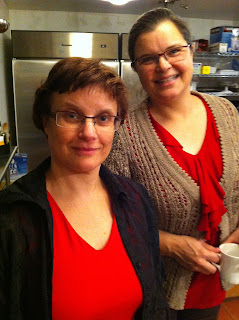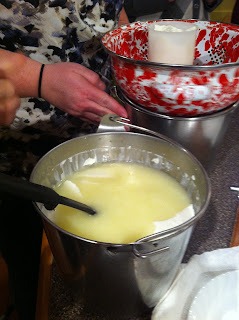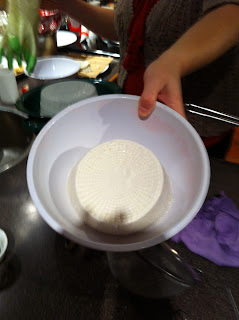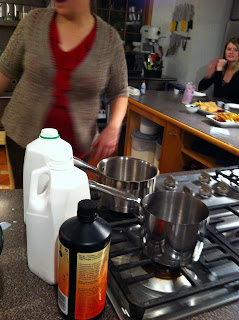
The lovely Louise May (she of chicken-at-city-hall fame) taught a cheese-making class at The Food Studio last night, and I was privileged to attend.
Louise has a herd of goats on her farm that she milks herself, and she de monstrated making cheese from commercially available (i.e., pasteurised) local goat’s milk, licensed under the Manitoba Dairy Act, as well as raw milk from her farm, which is not.
monstrated making cheese from commercially available (i.e., pasteurised) local goat’s milk, licensed under the Manitoba Dairy Act, as well as raw milk from her farm, which is not.
The Manitoba Dairy Act prohibits the sale of raw dairy in Manitoba, which is very unfortunate for those of us who would prefer it. A farmer may use it for herself or her dependants, but she can’t legally even give it away to anyone else, let alone make a living from it. There are many reasons to consider raw milk far superior to pasteurised milk, which is severely denatured. While I understand the public health concerns, it seems to me that a good inspection policy should be able to shut down any farm that operated in unsanitary conditions. It is quite insane that fast food is legal in Manitoba but raw milk is not. Definitely a campaign to consider once Louise is done with the urban chickens!
In any case, we learned how to make chevre, ricotta and feta, all of which turn out nicely with commercial milk, and mozzarella, which in general does not. We were able to compare the milk-curdling capabilities of apple cider vinegar and lemon juice (the apple cider won in terms of flavour). We learned about mesophilic starter culture and vegetable rennet (not made from baby calf stomach lining, yay).
 The Queen of Cheese Making (and source of all the recipes we learned) is Ricki Carroll, founder of the New England Cheesemaking Supply Company. She was mentioned in Barbara Kingsolver’s wonderful book (and the beginning of my journey into making stuff rather than buying it): Animal, Vegetable, Miracle: A Year of Food Life (affiliate link).
The Queen of Cheese Making (and source of all the recipes we learned) is Ricki Carroll, founder of the New England Cheesemaking Supply Company. She was mentioned in Barbara Kingsolver’s wonderful book (and the beginning of my journey into making stuff rather than buying it): Animal, Vegetable, Miracle: A Year of Food Life (affiliate link).
Ricki’s recipes are available online, but also neatly compiled into a book, Home Cheese Making: Recipes for 75 Homemade Cheeses (also an affiliate link).
Because nothing is ever perfect, I did have one complaint – I would have like d Louise to have given us a handout. With so many different kinds of cheese on the go, it became quite confusing to keep track of what goes into what. While I intend to acquire the book (or download my favourite recipes if I am feeling cheap), it would have been easier to make notes on a handout while they were fresh in my mind.
d Louise to have given us a handout. With so many different kinds of cheese on the go, it became quite confusing to keep track of what goes into what. While I intend to acquire the book (or download my favourite recipes if I am feeling cheap), it would have been easier to make notes on a handout while they were fresh in my mind.
In conclusion, a lovely time was had by all, there was much laughter and discussion as well as some serious learning. If you are interested in artisanal cheese, Louise’s classes are a great way to get into it.
Addendum: Louise’s recipes can be found at http://aurorafarm.ca/recipes/.

Louise’s recipes can be found at:
http://aurorafarm.ca/recipes/
You can make all these cheese (I guess except chèvre, LOL) with cow’s milk.
Sounds lovely! Wish I liked goat cheese. I can appreciate the art of making cheese, but goat cheese never quite makes it past my lips. Fortunately, if it makes an accidental appearance on my plate, I’m likely dining with someone who will happily take it from me. 🙂